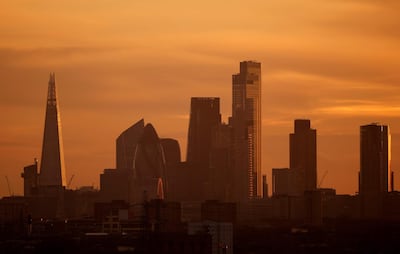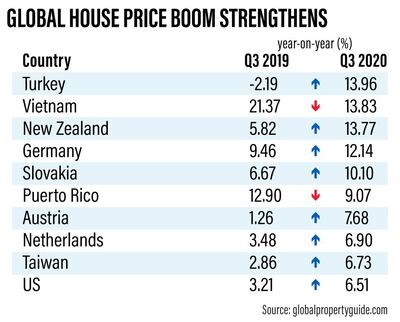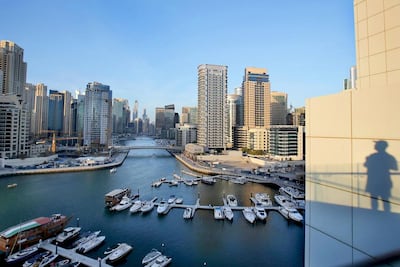2020 will go down as the year when global house prices should have crashed as Covid-19 sent the world hurtling into recession, but somehow didn't.
A combination of monetary stimulus, near-zero interest rates and steady demand helped underpin the market, sustaining prices and activity.
Incredibly, the worldwide house price boom even accelerated in many countries across Europe, Asia-Pacific, the US and Canada, according to Globalpropertyguide.com. It found that prices rose in 45 out of 55 housing markets for the 12 months to September 30, and fell in just 10.
Transaction volumes are also healthy, as the lockdown persuaded growing numbers to exchange cramped urban life for outdoor space and gardens, with homeowners moving to the suburbs or further out.
Property price growth in Turkey, Vietnam, New Zealand and Germany all topped 12 per cent, while Austria, the Netherlands, Taiwan and Canada grew between 6 and 7 per cent.
Prices in the Gulf region fell, though, with Saudi Arabia falling 3.51 per cent and Dubai edging down 4.88 per cent. Egypt fared worst of all major markets, posting a 22.31 per cent drop, the Globalpropertyguide study shows.
The US was hit hard by the pandemic but prices still rose 5.51 per cent, according to the S&P/Case-Shiller home price index, up from just 1.46 per cent the year before. The UK took a major hit from the pandemic, and also had to contend with Brexit uncertainty, but its market is enjoying yet another boom.
Prices rose 6.5 per cent in the year to November 30, according to local lender Nationwide. That was due to pent-up demand after the lockdown and the temporary stamp duty “holiday”, which triggered a surge in activity as buyers looked to bag a saving of up to £15,000 ($20,148).
Global house prices have defied gravity, just as they did after the 2008 financial crisis, and once again that is mostly down to low borrowing costs, as well as people's voracious demand for property.
With interest rates expected to stay low for some time, a crash may be averted next year, too.
This may disappoint some UAE-based expats and residents, who were hoping to bag a cut-price property in a correction.
Next year could still be bumpy, despite recent vaccine breakthroughs, as government support programmes and jobs disappear.
The International Monetary Fund projects that after falling 4.4 per cent this year, global gross domestic product will rebound by 5.2 per cent in 2021, but it also warned that “the ascent out of this calamity is likely to be long, uneven and highly uncertain”.
Kate Everett-Allen, head of international residential research at Knight Frank, rules out a crash in the major global cities.
She expects most cities to post growth in the low single digits in 2021, with Shanghai and Cape Town leading the way by rising 5 per cent.
London, Sydney, Paris, Berlin and Madrid will see prime prices rebound due to “low interest rates, pent-up demand, tax holidays or firm market fundamentals”, Ms Everett-Allen says.
London, Lisbon and Miami should each grow around 4 per cent in 2021, with Auckland, Paris, Berlin, Singapore, Monaco, Madrid, Sydney, Vancouver, Los Angeles and Geneva rising 3 per cent.
New York should recover as excess inventory is absorbed and buyers recognise its relative value, Ms Everett-Allen says. “Auckland, Vancouver, Geneva, Los Angeles and Miami have seen activity surge as residents looked to upgrade to larger properties with more outside space.”
Vienna, Melbourne, Hong Kong, Mumbai and New York should be more or less flat, with Buenos Aires the worst performer with a projected fall of 8 per cent, Knight Frank research shows.
The global property market will face some tough challenges next year, with Europe still in lockdown and fiscal stimulus measures set to taper off in early 2021, Ms Everett-Allen says. “Investors may suffer as rents decline due to the lack of international students and a surge in supply, as landlords switch from holiday lets to long-term rentals.”
Mortgages could be harder to come by, making cash buyers king, Ms Everett Allen adds. "Finance looks set to remain cheap but lenders will be more cautious, raising loan-to-value ratios and making finance costlier for highly-leveraged clients.”
So what about Dubai? Knight Frank forecasts another price fall next year, of a modest 2 per cent.
However, Arran Summerhill, company director at Holo Mortgage Consultants, is more optimistic. He says the Dubai property market was bottoming out before the pandemic, as buyers took advantage of low prices and cheap finance.
The Central Bank of the UAE’s decision in March to let banks increase LTVs by 5 per cent for first-time buyers has further boosted activity, he adds.
There is now an influx of first-time buyers, the majority of whom are targeting villa or townhouse properties rather than apartments, Mr Summerhill says.
He has seen signs of price growth in recent weeks, too. “Reports of bidding wars in prime areas suggest a lack of availability and high demand.”
Any buyer who can cover a 20 per cent down payment and transaction fees should find this a good moment to buy, he adds. "Property prices are their lowest for 10 years, interest rates are the lowest ever, and there are still deals to be done.”

International buyers should beware of changes as governments look to raise money to fund their pandemic spending splurge. Spain and Canada are considering wealth taxes, and the US and UK are looking at higher capital gains taxes, which are likely to hit second homeowners when they sell up.
Buying a property in London will get notably more expensive for international investors from April.
The current stamp duty holiday, which applies to both local and overseas buyers, expires on March 31, 2021.
On April 1, 2021, the stamp duty surcharge on overseas buyers is expected to jump from 3 to 5 per cent. These changes mean the total stamp duty bill for an oversea buyer purchasing a £500,000 property will jump from £15,000 to £40,000 overnight.
UAE-based buyers must factor in these costs and keep an eye on government announcements as the main stamp duty holiday could be extended due to a massive backlog in activity, says Islay Robinson, chief executive officer at Enness Global. “We are also waiting to see whether the surcharge on overseas investors will actually be introduced. All this makes market timing vital.”
Despite the UK's troubles, its property market is holding firm, particularly in prime areas, says Aaron Strutt, product and communications director at international mortgage broker Trinity Financial. "People have been predicting a crash ever since the last financial crisis, but demand continues to outstrip supply.”
Many international investors consider residential property to be crisis-resistant and remain keen to buy affordable apartments and single family houses, Dr Nicole Lux, senior research fellow at City, University of London’s Business School (formerly Cass), says.
“It is important not to buy at overpriced market values, while some European markets are expected to recover quicker than others. While today might be a good time to invest in Germany or the UK, it might not be the right time to invest in, say, Greece or Poland.”
As always, where you buy property is a personal decision, and may depend on factors such as where you come from, and where you plan to retire.
Analysts have been predicting a global property market crash for the past 15 years, but so far it hasn't happened.
The days of “flipping” properties for a fast profit might be over, though, as the global economy takes a massive hit from the pandemic. Interest rates cannot go any lower, and one day they may even rise. Make sure you can still afford to service your mortgage if they do.



